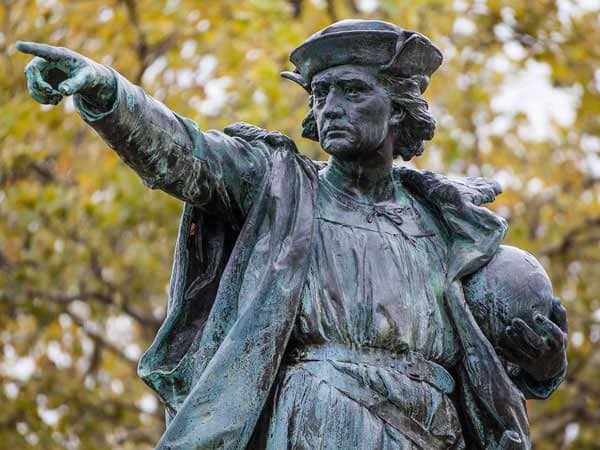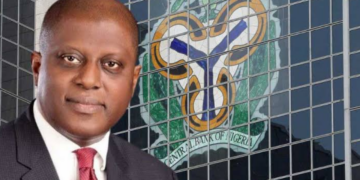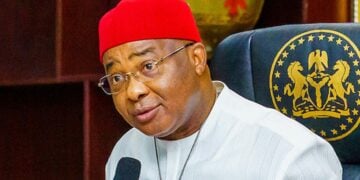The United States Embassy in Abuja and Consulate Office in Lagos announced that the offices will be closed on Monday, October 9, 2023, to commemorate Columbus Day.
The second Monday in October marks Indigenous Peoples’ Day and Columbus Day in the United States.
The two holidays are related. Indigenous Peoples’ Day recognises and celebrates the history and contributions of Native Americans, who lived on the continent long before Christopher Columbus claimed to have discovered America.
According to the U.S. Office of Personnel Management, Columbus Day is one of 11 federal holidays.
According to CNN, most banks including Bank of America, Wells Fargo and Citibank branches also closed for the Columbus Day holiday.
For centuries, the U.S. celebrated Christopher Columbus as the intrepid explorer who discovered the Americas — a symbol of the American ideals of entrepreneurship and innovation.
The story of the Italian navigator taught to generations of schoolchildren is shrouded in mythology. But for the Indigenous peoples who inhabited the Americas long before Columbus ever arrived, Columbus and his namesake holiday represent something much more sinister: the violent colonization of their lands and the brutal treatment of their people.
The movement to replace Columbus Day with Indigenous Peoples’ Day has been decades in the making. As a result of advocacy by Native American activists, many states and localities now observe the second Monday in October as Indigenous Peoples’ Day instead of — or in addition to — Columbus Day. That shift has since reached the federal level — in 2021, President Joe Biden became the first president to formally acknowledge Indigenous Peoples’ Day.
“It’s long overdue,” David Weeden, tribal historic preservation officer for the Mashpee Wampanoag Tribe, told CNN. “When you look back on all that we’ve endured and sacrificed, all the systemic oppression at the hands of various levels of governments and agencies and programs and everything else, the fact that we are still here is amazing.”
Here’s the history behind Indigenous Peoples’ Day, and what some Native Americans say the holiday means for them:
Indigenous Peoples’ Day came about as an alternative to Columbus Day
To understand the history of Indigenous Peoples’ Day, it’s important to understand how Columbus Day came about.
Columbus had been celebrated unofficially around the U.S. since the late 1700s. In 1892, President Benjamin Harrison issued a proclamation commemorating the 400th anniversary of his landing. As waves of Italian immigrants arrived in the U.S. in the late 19th and early 20th centuries, they faced prejudice and discrimination. To combat negative perceptions, a group of Italian-American elites took up the cause of Columbus Day, arguing that the contributions of Italian immigrants had helped make America the nation it was. In 1934, President Franklin D. Roosevelt designated Columbus Day a national holiday.
The narrative around Columbus Day helped uphold “the new racial order that would emerge in the U.S. in the 20th century, one in which the descendants of diverse ethnic European immigrants became ‘White’ Americans,” historian Malinda Maynor Lowery wrote in a 2019 article for The Conversation.
Eventually, Native Americans began to challenge the history behind it.
Inspired by the Civil Rights Movement, Native American activists in the late 1960s formed the Red Power Movement, built on principles of self-determination and cultural pride. At a 1977 United Nations conference in Geneva, Indigenous delegates from around the world resolved “to observe October 12, the day of so-called ‘discovery’ of America, as an International Day of Solidarity with the Indigenous Peoples of the Americas.”
It would be longer before their calls were adopted. South Dakota became the first to officially celebrate the day (calling it Native American Day) in 1990. The city of Berkeley, California, embraced Indigenous Peoples’ Day in 1992 as a protest to the 500th anniversary of Columbus’ arrival. Now, numerous states and more than 130 cities observe the holiday.
It’s a day to reflect on how the U.S. has treated Native Americans
For some, Indigenous Peoples’ Day is an occasion to consider the history of the U.S. and how it has treated Native people.
“It’s a time to reflect on all that we’ve been through as a people: How much we endured, how much we’ve persevered and how much we still have to continue to fight for — for ourselves, for generations before us and for generations that will come after us,” Weeden said.
Kitcki Carroll, an enrolled citizen of the Cheyenne and Arapaho Tribes of Oklahoma and executive director of United South and Eastern Tribes, Inc., sees the day as an opportunity to tell a different story about the US.
Indigenous people have often been erased from the country’s historical record — a survey from the National Congress of American Indians found that 87% of state history standards don’t mention Native American history after 1900, while 27 states don’t mention Native Americans in their K-12 curriculum.
Yet Native people continue to have a presence here, while the lands and natural resources that were taken from them became foundational to this country, Carroll said.
“The United States has evolved over time become the most powerful and wealthy nation the world has ever known,” he said. “It has Indian Country to thank for that.”
For others, Indigenous Peoples’ Day is about reclaiming power and celebrating progress. Crystal Echo Hawk, a member of the Pawnee Nation of Oklahoma and CEO of the social justice organization IllumiNative, points to the gains that Indigenous people have made in recent years, from political representation to media visibility.
“For too long, Native peoples have been rendered invisible or misrepresented in popular culture and media, but Native peoples are no longer tolerating or settling for erasure,” she wrote in an email to CNN. “Indigenous Peoples’ Day serves as a reminder of the diversity and depth of Native peoples, and how hard we’ve had to work for recognition and visibility.”
Some use the day to spotlight issues important to Indigenous communities
For all of its emphasis on commemorating Indigenous history and culture, Indigenous Peoples’ Day is also a time to move forward and look to the future.
Some Indigenous leaders use the holiday as an opportunity to draw attention to issues that continue to affect Native Americans today, including climate change, tribal sovereignty and land rights.
Carroll noted that the Biden administration has been taking steps in the right direction when it comes to the country’s relationships with tribal nations — in Biden’s 2021 proclamation, he committed the U.S. to “honoring the Federal Government’s trust and treaty obligations to Tribal Nations.” Having Deb Haaland as Interior Secretary also strengthened those efforts, Carroll said.
Weeden said he hoped that Indigenous Peoples’ Day might ignite discussions on reparations and how the U.S. might better empower tribal nations to be more self-sufficient.
“We deserve a right to remain in our ancestral homes,” he said. “We deserve to be able to eat from the waters and the lands that have sustained us for thousands of years.”





